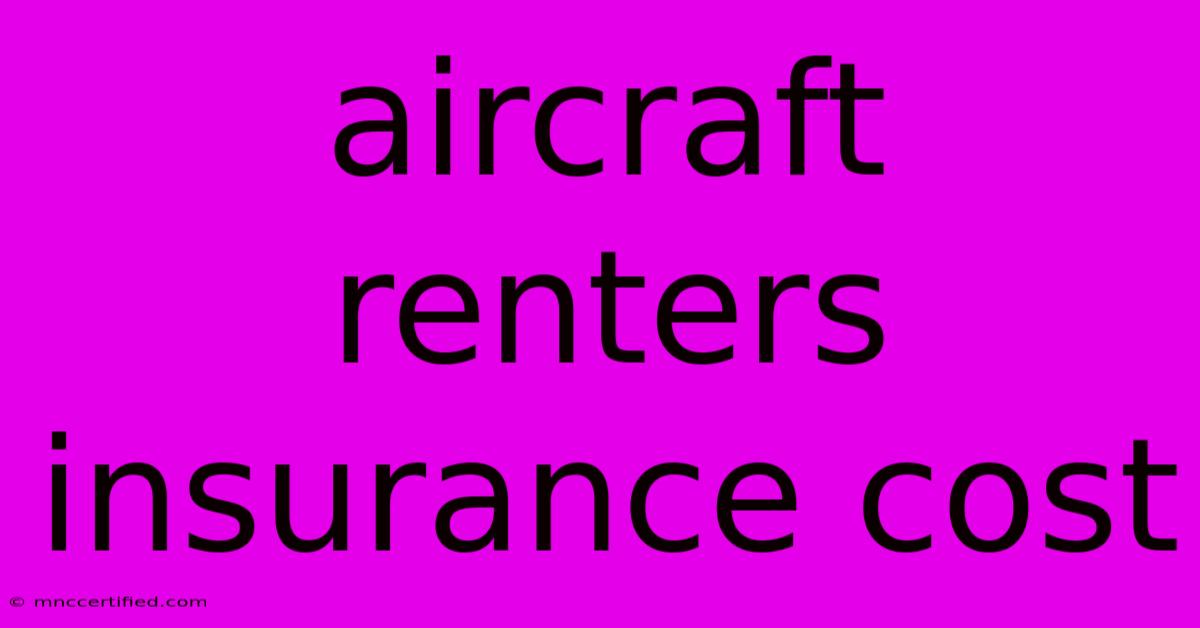Aircraft Renters Insurance Cost

Table of Contents
Aircraft Renters Insurance Cost: A Comprehensive Guide
Renting an aircraft is an exciting prospect, whether for leisure, business, or flight training. However, before you take to the skies, understanding the cost of aircraft renters insurance is crucial. This comprehensive guide breaks down the factors influencing the price, helping you budget effectively and secure the right coverage.
What is Aircraft Renters Insurance?
Aircraft renters insurance is a specialized policy protecting you, the renter, against financial liabilities arising from accidents or damage to the rented aircraft during your rental period. It's a critical component of responsible aircraft rental, shielding you from potentially devastating costs. Unlike general aviation insurance held by the aircraft owner, this policy focuses solely on the renter's responsibility while operating the plane.
Key Coverages Typically Included:
- Liability Coverage: This protects you against claims for bodily injury or property damage caused by your operation of the rented aircraft. This is arguably the most important aspect of the insurance.
- Hull Damage Coverage: While less common in basic renters insurance, some policies offer coverage for damage to the aircraft itself during your rental. This often comes with a deductible.
- Emergency Medical Expenses: This can cover medical costs for you and your passengers in the event of an accident.
Factors Affecting Aircraft Renters Insurance Cost
Several factors significantly influence the cost of your renters insurance:
1. Type of Aircraft:
The size and complexity of the aircraft directly impact the insurance premium. Larger, more sophisticated aircraft (like jets or turboprops) generally carry higher premiums due to the increased risk and potential repair costs. A small, single-engine aircraft will be considerably cheaper to insure.
2. Pilot Experience and Qualifications:
Your flight experience and certifications are key determinants. Pilots with extensive hours and appropriate ratings (e.g., instrument rating, type ratings) often qualify for lower premiums. Inexperienced pilots or those with limited certifications will face higher costs reflecting a perceived higher risk. Always be honest about your flight experience. Misrepresenting your qualifications can invalidate your insurance.
3. Rental Duration:
The length of your rental period directly impacts the cost. Longer rentals generally lead to higher premiums.
4. Flight Area and Purpose:
The geographic area where you plan to fly influences the risk assessment and therefore the premium. Flying in densely populated areas or challenging terrain increases the risk and the cost. The purpose of the flight (e.g., personal recreation vs. business) can also influence the price; commercial flights might attract higher premiums.
5. Insurance Provider:
Different insurance providers offer varying levels of coverage and pricing structures. Comparing quotes from multiple insurers is crucial to finding the best value for your needs.
How to Find Affordable Aircraft Renters Insurance
- Shop Around: Obtain quotes from several insurers specializing in aviation insurance.
- Bundle Policies (if applicable): Some insurers may offer discounts if you bundle your renters insurance with other aviation-related policies.
- Maintain a Clean Safety Record: A history of safe flying will help you secure more favorable rates.
- Consider Higher Deductibles: Choosing a higher deductible can lower your premium; however, this means you'll pay more out of pocket in the event of a claim.
The Importance of Adequate Coverage
Don't underestimate the potential costs associated with aircraft accidents. Underinsured or uninsured accidents can lead to significant financial hardship. Adequate insurance protection is not a luxury; it's a necessity. Always ensure you have sufficient coverage to protect yourself and the aircraft owner.
Remember to always check with your chosen flight school or aircraft rental company for their specific insurance requirements and recommendations. They can provide valuable insights and assist in finding suitable coverage. Ignoring this critical step could jeopardize your rental agreement and leave you exposed to significant financial risks.

Thank you for visiting our website wich cover about Aircraft Renters Insurance Cost. We hope the information provided has been useful to you. Feel free to contact us if you have any questions or need further assistance. See you next time and dont miss to bookmark.
Featured Posts
-
Cryptocurrency Exchange To Fiat
Nov 23, 2024
-
F1 Nears Expanded Grid For Gm
Nov 23, 2024
-
Springbok Call Up For Hanekom
Nov 23, 2024
-
Crypto Art Initialism Crossword
Nov 23, 2024
-
Portuguese Cup Sporting Amarantes Test
Nov 23, 2024